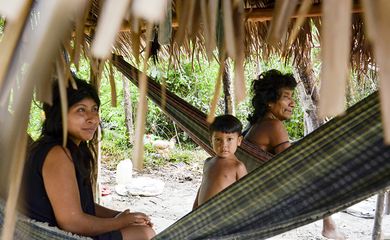Land demarcation good for environment, chieftains say


Daiara Tukano, who recently became a schoolteacher in the Federal District, said that Brazilians should be proud of their indigenous origins

Land demarcation and the recognition from Brazilians of the importance of the indigenous populations in the country are still among the main challenges facing these peoples, who were celebrated all throughout the country on Sunday (Apr 19). Representatives from indigenous peoples who are used to coming to Brasília to stage demonstrations and protests mentioned the key role of the holiday in raising society's awareness, but warn that the topic is not only about celebrating.
Yawalapiti chieftain Piracuman, who lives in the Xingu Indigenous Park, northern Mato Grosso, notes the importance of environmental preservation for the ethnic groups. He argues that mapping out indigenous territories is “important not just for us, but for everyone. We know the forests very well. They're like a filter to us—it's got oxygen and medical herbs. Today, producers no longer respect springs. Deforestation has already reached them. Not a sapling is left standing. When they dry, water runs out. I'd like to ask [soy] producers to carry out reforestation measures where they've caused damage,” he declared.
Piracuman, brother and fellow chieftain of Aritana, the highest-ranking leader of the Xingu, said that “those people in Congress are not looking at the indigenous people. That house only looks for progress, deforestation, planting, and building hydroelectric power plants in the rivers. And the Indians, who have long been here, are under threat,” he says. He adds that the climate changes have already started affecting the indigenous territories, with untimely rains and devastated areas near the rivers. He reports that, in 2014, a tornado hit the country for the first time, wrecking houses and tearing down trees.
Chieftain Álvaro Tukano is also among those who fight for the forests. He lives in Brasília and took up on Sunday (19) the symbolic role of director at the Memorial of Indigenous Peoples. A man from the Tukano nation in Amazonas state, he believes that the recognition of the three indigenous areas, announced by the federal government Monday (20), is one of the state's duties.
“The indigenous territories—or all of the territories in the Amazon [Rainforest region], are the areas responsible for evaporation. They supply water to the whole country and also South America. That's why it is [President] Dilma [Rousseff]'s task to demarcate and recognize, and fight violence. It's about fulfilling international laws and not building the plants. This is the kind of wisdom she should preserve,” he argued.
Two areas were recognized in Amazonas state in order to meet the demands of the Kaixana and Mura peoples. The Arara and the Juruna are to be given the Arara da Volta Grande Indigenous Territory, in the municipality of Senador José Porfírio, in Pará state—a recognition that comes as part of the licencing procedures of the Belo Monte Hydroelectric Power Plant. In Piracuman's view, what lies behind the measures is the fact that the areas currently occupied by the Indians will be flooded after the plant is brought into operation.
Daiara Tukano, who recently became a schoolteacher in the Federal District, said that Brazilians should be proud of their indigenous origins. She studied visual arts at the University of Brasília and was admitted after taking a public examination from the Education Secretariat. In her opinion, there's a historic problem facing the legitimacy of the indigenous peoples.
“Indigenous people are only recognized when they live in their village. [Today, however,] we're everywhere to be seen: at universities, working in the cities, and also on the field. It's important that Brazil recovers the respect of and the pride in the Indians,” she said.
Translated by Fabrício Ferreira
Fonte: Land demarcation good for environment, chieftains say


